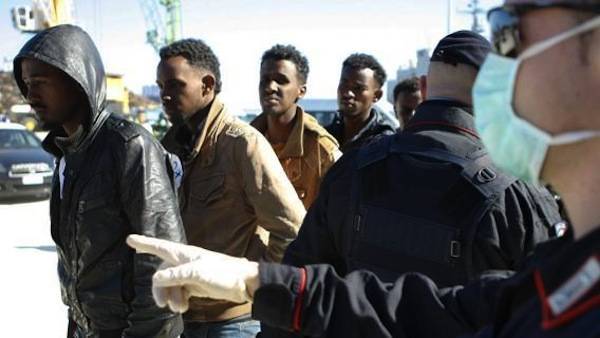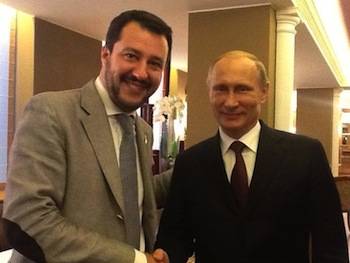Terror Hides Among the Migrants?
ROME – It was supposedly an Egyptian diplomat in London who “revealed” that extremist Muslim terrorists are expected to be hiding among the thousands of migrants herded out of Libya and toward Italy on rickety boats.
The London Daily Telegraph reported Feb. 17 that, “The jihadists hope to flood Libya with Isil militiamen who will then pose as migrants on people trafficking vessels heading to Europe.”
Although this may eventually be true, to date all jihadist attacks in Europe have been perpetrated by those living in Europe, not by newcomers. So far there is no trace of terrorists hiding among the migrants: “We take their fingerprints, we check each one,” said a police spokesman in Sicily.
Even without this new risk, the hordes of migrants fleeing war in Syria, Iraq and Sub-Saharan Africa to land on Italian shores (most of whom go elsewhere in Europe) present Italy with an ever more intractable political problem, as well as for their care-and-feeding.
The numbers are terrifying: in 2014 Italy was the first European port of call for 170,000 migrants, more than double the 156,000 who had arrived during the previous two years.
Last week, as the situation in Libya worsened, 2,164 migrants arrived on sixteen rickety boats in just 36 hours, and 300 more died when their boat sank. Exactly 3,538 had arrived in January, despite waves “high as a three—story building,” said the captain of an Italian rescue boat. The sea was so rough that he feared for his own crew as they helped the terrified migrants.
In a nasty new twist, “scafisti” (illegal captains) armed with Kalashnikovs fired gunshots at the Italian Coast Guard ship trying to rescue migrants 50 miles off the Libyan coast. Investigators here say that Jihadists are already making money from the migrants, who are now paying up to $3,000 for passage toward Europe via Libya. One of the arrivals had a gunshot wound in his leg because, frightened at the conditions, he tried to avoid leaving but was shot and thrown aboard the rubber boat.
The fear that jihadists will hide among the desperate migrants is already unleashing political problems in Italy. Matteo Salvini, 51, head of Lega Nord since December 2013, asked this week: “Are they really peace lovers, these immigrants arriving in Italy? Up to me, I’d take care of them, give them food and a drink, help them. But I’d keep them way out at sea and not let them land here. We already have enough [of them].”
Anti-migrant talk like this finds listeners all over Europe, and Salvini’s party has leaped from its origins as a strictly Northern event to winning a hearty following in the South. Polls show that his party continues to make steady gains, moving up in just one week from 15.2 to 15.5%, according to La Sette TV. This puts Salvini three points above Silvio Berlusconi’s troubled Forza Italia; indeed some believe that the aggressive Salvini may well take over as the leader of the Italian right, to rival Premier Matteo Renzi.
Salvini has an eccentric curriculum. An activist in the young rightist “Padani” movement promoting independence for the Po Valley region, he ran as a candidate on the Communist Padani list in 1997. He has been a member of the European Parliament and a Milan city councilman.
In just two years he has re-anchored the Lega Nord as an Italian rather than strictly Northern, separatist party, as it was under the now retired Umberto Bossi. Salvini knows how to capture headlines, as when he posed semi-nude on the cover of the magazine Oggi just before Christmas.
This week the headlines were about his refusal to pay the customary courtesy call, which his own party had requested, upon the new president of Italy, Sergio Mattarella. “Che ci vado a fare?” (Whatever would I do there?), he asked.
“What do I have to ask him – his barber’s phone number?” The insolence angered Alessia Morani, deputy head of the Partito Democratico (PD) group in the Chamber of Deputies, who called Salvini’s words “unacceptable, contradictory and manipulative,” and showing, “once again, little sensitivity to state institutions.” From the President came a note of surprise at his no-show, to which Salvini responded that, “When it’s useful, I’ll go.” Rather pointedly, Beppe Grillo, head of Movimento Cinque Stelle (M5S), does plan to call upon President Mattarella.
Salvini calls NATO leaders “cretins” for sending 5,000 men to the Ukraine. Instead of sending troops to the Russian border, NATO should have sent them to fight IS. Salvini himself paid a recent courtesy call upon Russia’s Vladimir Putin, one of whose goals is to discredit NATO.
Salvini and his ilk like Putin, who has gone out of his way to cultivate parties on Europe’s far right and on its far left as well. In the UK Nigel Farage, head of Britain’s far-right, anti-European Union UKIP, has called Putin one of the world leaders he most admires. Marine Le Pen in France is another: according to NPR, a Russian bank has loaned her Front National party $11 million.
Salvini has also visited North Korea, which he described on his return as a “gigantic opportunity for our businessmen – they [North Korea] need many things.” There was a link with his Russian visit: “The embargo against North Korea is idiotic and should be lifted, as should that imposed upon Putin’s Russia.” The sanctions upon Russia were imposed because of Russian involvement in the war in the Ukraine.




































i-Italy
Facebook
Google+
This work may not be reproduced, in whole or in part, without prior written permission.
Questo lavoro non può essere riprodotto, in tutto o in parte, senza permesso scritto.